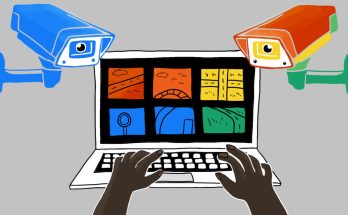JAKARTA, cssmayo.com – Online Privacy: Navigating the Digital Landscape with Data Security and Personal Control isn’t just tech-babble—it’s life now! There was a time I thought, as long as my password was hard to guess, I was safe online. Spoiler: I learned the hard way that’s like locking your door but leaving the windows wide open.
In an age where our lives are increasingly lived online—from banking and shopping to socializing and streaming—online privacy has never been more critical. Every click, keystroke, and swipe can generate data that companies, governments, or malicious actors could exploit. In this article, we’ll explore why Online Privacy matters, share practical takeaways from my own experiences, and provide actionable steps to regain control of your digital footprint.
What Is Online Privacy?

Online Privacy refers to the right and ability of individuals to control how their personal information is collected, used, shared, and stored on the internet. It encompasses:
- Data you intentionally provide (e.g., filling out forms, social media posts)
- Behavioral data collected passively (e.g., browsing history, location tracking)
- Metadata generated by devices and applications (e.g., timestamps, IP addresses)
Why Online Privacy Matters
- Protecting Personal Safety
Sensitive data exposure—like home address, travel plans, or financial records—can put you at risk of identity theft, stalking, or fraud. - Maintaining Digital Reputation
Old posts, photos, or comments can resurface and affect job prospects or personal relationships. - Preserving Autonomy
When third parties collect your data without consent, they shape the ads you see, the prices you pay, and even the news you consume. - Upholding Human Rights
Privacy is a fundamental right recognized by international declarations; its erosion can lead to mass surveillance and discrimination.
My Journey to Privacy Awareness
- The Wake-Up Call
I once discovered that an ad network had tracked my browsing across five different websites in a single afternoon. That realization sparked my commitment to reclaim my data. - Experimenting with Tools
I installed a privacy-focused browser (Brave), a VPN, and a tracker blocker (uBlock Origin). The difference was immediate—fewer targeted ads, faster page loads, and greater peace of mind. - Learning to Say “No”
Filling out fewer online forms and opting out of data-sharing agreements helped me streamline what companies know about me. - Balancing Convenience and Security
I found that strong passwords and two-factor authentication (2FA) only take seconds to set up but save hours of headache down the road.
Best Practices for Online Privacy
- Use Strong, Unique Passwords
- Employ a password manager (e.g., Bitwarden, 1Password) to generate and store complex credentials.
- Enable Two-Factor Authentication
- Wherever available, activate 2FA via authenticator apps (Google Authenticator, Authy) instead of SMS.
- Browse with Privacy in Mind
- Choose browsers like Firefox or Brave with built-in tracker blocking.
- Use browser extensions such as Privacy Badger or DuckDuckGo Privacy Essentials.
- Secure Your Network
- Always use HTTPS websites.
- When on public Wi-Fi, connect through a reputable VPN to encrypt your traffic.
- Audit App Permissions
- Regularly review mobile app permissions and revoke access to your camera, microphone, and location when not needed.
- Opt Out and Delete Data
- Use tools like Google’s “My Activity” page to review and delete stored data.
- Exercise “Right to Be Forgotten” requests where legally available.
- Be Wary of Phishing and Social Engineering
- Never click suspicious links or download attachments from unknown senders.
- Verify requests for personal data by contacting official channels directly.
Common Challenges
- Data Brokers
Hundreds of companies buy and sell personal data—often without your knowledge. Opting out can be time-consuming and incomplete. - Convenience vs. Privacy Trade-Offs
Many popular services require you to sacrifice some privacy for functionality. Deciding where to draw the line is a personal choice. - Evolving Threat Landscape
As technology advances, so do attackers’ tactics—meaning you must stay informed and update your defenses regularly. - Regulatory Gaps
Privacy laws like GDPR and CCPA offer protection in certain regions but leave many users worldwide without recourse.
The Future of Online Privacy
- Privacy-Enhancing Technologies (PETs)
Homomorphic encryption, secure multi-party computation, and differential privacy promise data analysis without exposing raw information. - Decentralized Identity
Blockchain-based digital IDs could give individuals control over which attributes they share and with whom. - AI-Powered Privacy Assistants
Intelligent agents that monitor your online activity in real-time, warn of potential leaks, and automate privacy settings. - Global Regulatory Alignment
As public awareness grows, we may see more comprehensive, cross-border privacy regulations to standardize protections.
Conclusion
Online Privacy is not a luxury—it’s a necessity in our data-driven world. By adopting a combination of the right tools, informed habits, and a healthy dose of skepticism, you can navigate the digital landscape with greater confidence and control. Start today: audit your settings, secure your passwords, and take ownership of your personal data before someone else does.
Elevate Your Competence: Uncover Our Insights on Techno
Read Our Most Recent Article About Gesture Recognition: Bridging Human-Computer Interaction Through Intuitive Movement!




